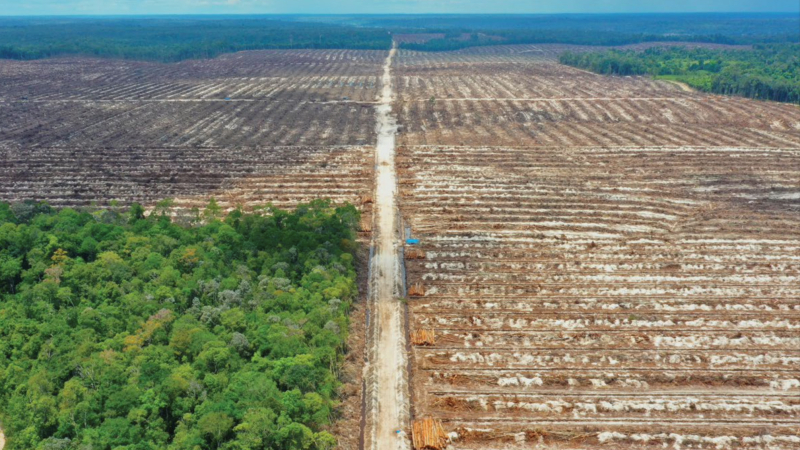Project – On record
This profile is no longer actively maintained, with the information now possibly out of dateEnvironmental Paper Network
Greenpeace International, Rainforest Action Network, Woods & Wayside International & Yayasan Auriga Nusantara
Sergio Baffoni, EPN: sergio.baffoni@environmentalpaper.org

Project – On record
This profile is no longer actively maintained, with the information now possibly out of dateEnvironmental Paper Network
Greenpeace International, Rainforest Action Network, Woods & Wayside International & Yayasan Auriga Nusantara
Sergio Baffoni, EPN: sergio.baffoni@environmentalpaper.org
Why this profile?
This new mega-scale pulp mill under construction in northeast Kalimantan, Indonesia is expected to threaten some of the world’s largest tropical rainforests, and is also leading to land grabs and health impacts on local communities.
What must happen
Banks must not finance, directly or indirectly, the Phoenix Mill until the project sponsors have implemented clear No Deforestation, No Peatland and No Exploitation (NDPE) policies that extend to their entire operations and supply chains, with a deforestation cut-off date of June 2015 and effective mechanisms for verification and accountability by external parties, and until PT Phoenix Resources has declared its ultimate beneficial owner and has developed a credible and long term wood supply plan.
| Sectors | Pulp, Paper and Paperboard Mills |
| Location |
|
| Status |
Planning
Design
Agreement
Construction
Operation
Closure
Decommission
|
A new mega-scale pulp mill is currently under construction on the island of Tarakan in northeastern Kalimantan, in the island of Borneo.
The Phoenix pulp mill is designed to produce semi-chemical pulp, and according to the project’s Environmental Impact Assessment, the mill will have two production lines and a total pulp capacity of 1.7 million tons/year. Once it is fully operational, the mill is projected to consume at least 3.3 million green metric tons (GMT) of wood fibre on an annual basis.
An NGO investigation examined corporate records to document RGE’s links to the Phoenix pulp mill. Despite its well-publicised commitment to “No Deforestation”, Indonesia’s RGE Group, one of the world’s largest pulp and paper companies, still has deforestation in its pulp supply chain. RGE is also now linked to a new mega-scale pulp mill under construction in northeast Kalimantan, Indonesia which is expected to threaten some of the world’s largest tropical rainforests.
Impact on human rights and communities
Impacts of dust and traffic: Despite the project still being at an early stage, local impacts of the construction process are already being felt by the local community. Around the site the heavy traffic and related dust causes respiratory problems and kills local gardens. A protest has been organized by local people, but despite promises, the situation did not improve.
Land-grabbing in the supply chain: In three different provinces, PT Industrial Forest Plantations, PT Adindo Hutani Lestari and PT Fajar Surya Swadaya are expanding their pulpwood plantations to feed the pulp mill, leading to land-grabbing and to the destruction of the rainforests which provide resources to the local communities. Furthermore, the dredging of the shallow waters directly threatens local fishing and especially the local small scale shrimp farming.
An atmosphere of intimidation: The NGO investigation team visiting the area reported a climate of intimidation around the mill, and noted that local people are visibly scared to talk about it. Local residents are also scared by the local militia charged to keep public order, which is tightly collaborating with the mill owners and is prone to make use of violence.
Impact on climate
Climate and peatlands: Part of the pulpwood concessions that would provide timber to the Phoenix pulp mill lies on peat soil. To produce acacia pulpwood, palm oil or other non-native agricultural crops on a peat bog, water must be drained away with canals. After drainage, the peat starts to oxidize, releasing carbon in the form of CO2. Even without fires, peat releases massive amounts of greenhouse gases into the atmosphere, up to 80 tonnes CO2 per hectare every year. Drained peatland contributes more than half of Indonesia’s emissions profile, which in addition to above ground deforestation emissions, launch Indonesia among the world's highest global greenhouse gas emitters. Depending on the extent of the peat bogs in the plantations intended to supply the paper mill, the new mill can cause relevant emissions of CO2, and become cause of extensive and recurring forest fires, as drained peatlands used for agriculture and forestry are susceptible to burn as dry peat is highly inflammable and very difficult to extinguish.
Impact on nature and environment
The Phoenix pulp mill construction site has been started by removing precious mangrove. The port construction included dredging of the shallow waters that are crucial for the costal environment.
The main impact of the Phoenix pulp mill however is on rainforests: the mill will place new pressures on natural forests in Indonesia, as the mill’s demand for wood fibre is likely to drive the development of large areas of monoculture pulpwood plantations.
Sumatra's rainforests have been largely cut down, and deforestation, fuelled by demand for pulpwood and palm oil, has affected the western part of Borneo, while central areas of the island are already directly threatened by the construction of the new capital.
Large areas of rainforest are still present in the eastern region of Borneo, in the provinces of East and North Kalimantan, precisely where the new paper mill is being built. Forest areas most immediately at risk include those within forestry concessions (currently supplying a chip mill also linked to RGE, Balikpapan Chip Mill) in the provinces of North, East, and Central Kalimantan and those linked to RGE companies in South Papua and West Papua. Spatial analysis using satellite imagery identifies over 600,000 hectares of standing tropical rainforest within these seven timber and plantation concessions.
